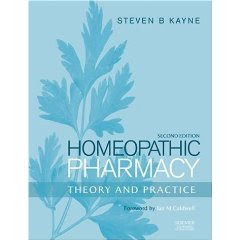Homeopathic Pharmacy: Theory and Practice

This
2nd edition gives every health professional and pharmacist the broad
information they need to dispense and counter-prescribe homeopathic
methods with
confidence. Designed as both a complete source of initial
information and an everyday reference, Homeopathic Pharmacy
provides detailed information on the procedures, principals, and
applications that are essential in the practice of homoeopathic
medicine. It
describes the application
of homeopathy for both general situations, such as first aid,
dentistry, sportscare, and petcare, and for specific situations, such as
allergies, infections, and teenagers’ problems.
*Details procedures relevant to pharmacists and other health
professionals – including manufacturing, dispensing, and
counter-prescribing.
*Outlines the theoretical principles of
homoeopathic prescribing.
*Describes the application of homeopathy for both general and specific situations.
*Provides easy-to-use
reference tables for 60 common remedies and the symptoms related to their prescription.
*Critically reviews important research papers and provides a guide to designing research tools.
*Discusses the legal status of homoeopathic remedies.
*Gives an account of the
historical development of homeopathy in Europe and beyond.
*Contains practical information such as homeopathic pharmacopoeias, methods of preparation of homeopathic medicines, nomenclature for potencies, dosage forms, and interpreting,
dispencing, and pricing prescriptions.
*Covers new developments in pharmacy.
*Section on research expanded and improved, taking a more evidence-based approach.
*Fully updated legal section incorporates legal status in the USA, Canada, and
EuropeReviewI have always suggested strongly to new students of homeopathy that
they need to learn how to take a remedy, by which I mean to undergo the
expereince of being a patient if they have not yet done that. They also
need to learn how to prove a remedy - to take part in a proving. And
lastly they need to learn how to make a remedy. This is the book to
help us all do that. Many of us have gone far beyond our first year
with only a hazy notion what goes on benind a pharmacy counter, even if
we had a go at succussion during a demonstration lesson. This book goes
into great detail about about potencies and scales and how our remedies
are made, their history, the legislation, the may different source
materials and standars of homeopathic pharmacy. It is a unique book,
there is nothing else like it, and it is almost a new book compared with
the first edition 1997.
This rudite book is full of
surprises. It is a full-on textbook about homeopathy for pharmacists,
but it is also a textbook about pharmacy for homeopaths. The
introduction to homeopathy is deep and wide and immersed in both the
classic philosophy of homeopathy, and modern research results.
Interspersed with the serious parts are wonderful anecdotes like that
one above. I think the best one
involves a computer and a dram of
single malt wiskhy. In case you have not realised this by now Stephen
Kayne is form Glasgow where he is honorary consultant
pharmacist,
glasgow Homeopathic Hospital and visiting lecturerein complementary
medicine at the School of Pharmacy, University of Starthclyde. He was
dean of pharmacy for the Faculty of Homeopathy and owner of Freeman's
pharmacy, now manged by his son.
One aspect which is close to
current concerns , is how the author tackles competency. When should a
pharmacists attempt an over -the counter prescription, when should a
referral to a homeopath be made? Or when whould allopath be more
appropriate? He is entirely sympathetic to the Society , prominently
named in the resources list. 'Care must be take to remain within one's
limits of
competency.' We
homeopaths are not competent if we do not
understand the issues of how remedies are made, and here are the ideas
and information more than competenly
explained.The Homeopath, Winter 2006
"With
the growing public interest in Complimentary and Alternative Medicine
(
CAM), against the backdrop of speculation and controversy over
homeopathy there is a great need for a text book like this one"
"It answers many questions that health
professionals may have concerning Homeopathy"
"This is an essential desk top reference book for all homeopaths, students of homeopathy and pharmacists"
Anita Shah - Royal London Homeopathic Hospital
Homeopathy, 2006
About the Author Steven B. Kayne practised in Glasgow,
UK, as a Community Pharmacist
with an interest in homeopathy and other complementary disciplines for
more than 30 years. He served terms on the councils of the British
Homeopathic Association and the Faculty of Homeopathy and was the first
Pharmacy Dean of the Faculty from 1999 to 2003. He was awarded an
Honorary Fellowship of the Faculty in 2000. He now serves on several
Government bodies in an advisory capacity and is Honorary Consultant
Pharmacist at Glasgow Homeopathic Hospital and Visiting Lecturer in
complementary medicine at the University of Strathclyde in Glasgow. He
also writes and lectures widely in the UK and overseas on a variety of
pharmacy and related healthcare topics. Dr Kayne is a member of the
Scottish Executive of the Royal Pharmaceutical Society of Great Britain
and Chair of the
College of Pharmacy Practice in Scotland.
GET IT HERE 




